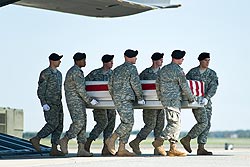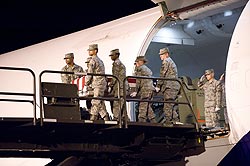 |
 CBP Shares Responsibility for Receiving the Remains of Fallen Soldiers who Die Abroad
(11/09/2009) U.S. Customs and Border Protection joins the nation as it pauses on Veterans Day to remember all who have served in the armed forces. CBP is also honored to daily serve those fallen soldiers on their final return home. U.S. Customs and Border Protection joins the nation as it pauses on Veterans Day to remember all who have served in the armed forces. CBP is also honored to daily serve those fallen soldiers on their final return home.  | click for hi-res
 | | The CBP role of clearing the escorts and remains for reentry is an important aspect of security, health and safety procedures. Photos courtesy of the Air Force Mortuary Affairs Operations Center Public Affairs. |
|
|  |  |
CBP plays an important role in the solemn responsibility of receiving fallen soldiers and their escorts back into the United States with the staff of the Charles C. Carson Center for Mortuary Affairs at the Dover Air Force Base in Delaware. CBP places a high priority on processing the flights bringing in fallen soldiers, and maintains more personnel at Dover, the nation’s largest military mortuary, than at any other air force base. Before the planes carrying deceased soldiers arrive at Dover, CBP staff have already begun their work. They coordinate with mortuary personnel to ensure a seamless procedure that allows for the dignified transfer of the fallen to take place without delay or intrusion. Dignified transfer is the term used for the solemn movement of the deceased from the aircraft to the mortuary transport vehicle by an Honor Guard composed of members of the same military service as the fallen. |  | click for hi-res
 | | Personnel performing the Dignified Transfer are from the same branch of service as the deceased. Photos courtesy of the Air Force Mortuary Affairs Operations Center Public Affairs. |
|
|  |  |
Since 1955, the remains of more than 50,000 service members have arrived at Dover for identification and funeral preparations. Dover Supervisory CBP Officer Ivan Lebron characterizes CBP’s role as “the saddest duty we have. We have received remains from the Vietnam war, Desert Storm, Desert Shield, Operation Iraqi Freedom and Operation Enduring Freedom.”The somber circumstances call for both professionalism and compassion. The Dover CBP staff value their role in facilitating the final return of those who have made the ultimate sacrifice for their country. |
 |
|  |  |
 |